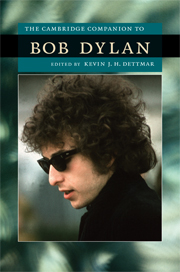Book contents
- Frontmatter
- Introduction
- Part I Perspectives
- 1 Bob Dylan and the Anglo-American tradition
- 2 Bob Dylan and Rolling Thunder
- 3 Bob Dylan as songwriter
- 4 Bob Dylan as performer
- 5 Bob Dylan and collaboration
- 6 Bob Dylan and gender politics
- 7 Bob Dylan and religion
- 8 Bob Dylan and the Academy
- 9 Bob Dylan as cultural icon
- Part II Landmark Albums
- Works cited
- Index
2 - Bob Dylan and Rolling Thunder
from Part I - Perspectives
Published online by Cambridge University Press: 28 May 2009
- Frontmatter
- Introduction
- Part I Perspectives
- 1 Bob Dylan and the Anglo-American tradition
- 2 Bob Dylan and Rolling Thunder
- 3 Bob Dylan as songwriter
- 4 Bob Dylan as performer
- 5 Bob Dylan and collaboration
- 6 Bob Dylan and gender politics
- 7 Bob Dylan and religion
- 8 Bob Dylan and the Academy
- 9 Bob Dylan as cultural icon
- Part II Landmark Albums
- Works cited
- Index
Summary
In the fall of 1975, just before embarking on the Rolling Thunder Revue tour, Bob Dylan recorded a raucous version of “Buckets of Rain” with Bette Midler for her album Songs for the New Depression. The album title was appropriate because Dylan, like Midler, had long drawn on the cultural memories of the Great Depression. The young Dylan emerged in the boom times of the early 1960s as a curiously anachronistic masquerade of a Depression singer - “in times behind, I too / wished I'd lived / in the hungry thirties,” he wrote in an early liner note. If the ur-history behind the work of Great Depression-era artists like Orson Welles was the tale of the decline and fall of the Lincoln Republic, the ur-history behind Dylan's work was the epic tale of the Great Depression, of floods and dust bowls, race records and hillbilly records, Pretty Boy Floyd and Blind Willie McTell. But the album title was also appropriate because the long boom of postwar capitalism was then collapsing into a new depression. The economic slump between the mid-1970s and the early 1990s stands as what we might now call the Great Recession, since the term “recession” had been adopted at the time as a euphemism for “depression” by then always associated with the “Great Depression” of the 1930s. Ironically, the term “depression” had itself been a euphemism of the 1930s, invented to avoid the even more terrifying memories of the “panic” of 1893. By the early 1990s, as one of the major economic studies of the period concluded, “the majority of Americans were worse off . . . than they were at the end of the 1970s,” and “those in poverty in 1992 were significantly poorer than the poor in 1979” (Mischel and Bernstein 2, 7). And the Great Recession was not merely an economic watershed; it came to mark a distinctive period in US cultural history, the age of hip hop.
- Type
- Chapter
- Information
- The Cambridge Companion to Bob Dylan , pp. 28 - 41Publisher: Cambridge University PressPrint publication year: 2009
- 1
- Cited by



